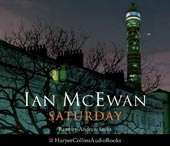Saturday abridged audiobook (5 CDs)
read by Andrew Sachs

Resumen del libro
Saturday, February 15, 2003 Henry Perowne wakes before dawn to find himself already in motion, drawn to the window of his bedroom. He is a contented man a successful neurosurgeon, the devoted husband of Rosalind, and proud father of two grown-up children. What troubles Perowne as he stands at his window is the state of the world the impending war against Iraq, and a general darkening and gathering pessimism since the attacks on New York and Washington eighteen months before. Later during this particular Saturday morning, Perowne makes his way to his weekly squash game with his anaesthetist, trying to avoid the hundreds of thousands of marchers filling the streets of London, protesting against the war. A minor accident in his car brings him into a confrontation with Baxter, a fidgety, aggressive, young man, on the edge of violence. To Perowne's professional eye, there appears to be something profoundly wrong with him. Towards the end of a day rich in incident Baxter appears at the Perowne home during a family reunion with extraordinary consequences.
Biografía del autor
x{0026}lt;p Javier Fernández de Castro, nacido en Aranda de Duero, Burgos, en 1942, pasó parte de su infancia en Zaragoza, trasladándose después a Barcelona y Pamplona, donde estudió periodismo. Desde en tonces ha ejercido diversos oficios relacionados con la prensa, la televisión, la enseñanza y la edi ción, siempre buscando la distancia necesaria para poder escribir novelas, entre las que se cuentan: x{0026}lt;em Alimento del saltox{0026}lt;/em (Barral, 1974),x{0026}lt;em Así en la tierrax{0026}lt;/em (Barral, 1977), x{0026}lt;em El laberinto de fango x{0026}lt;/em (Argos Verga ra, 1983) y x{0026}lt;em La novia del capitánx{0026}lt;/em (Mondadori, 1987).x{0026}lt;/p x{0026}lt;p Foto Elsbeth Franckenx{0026}lt;/p








